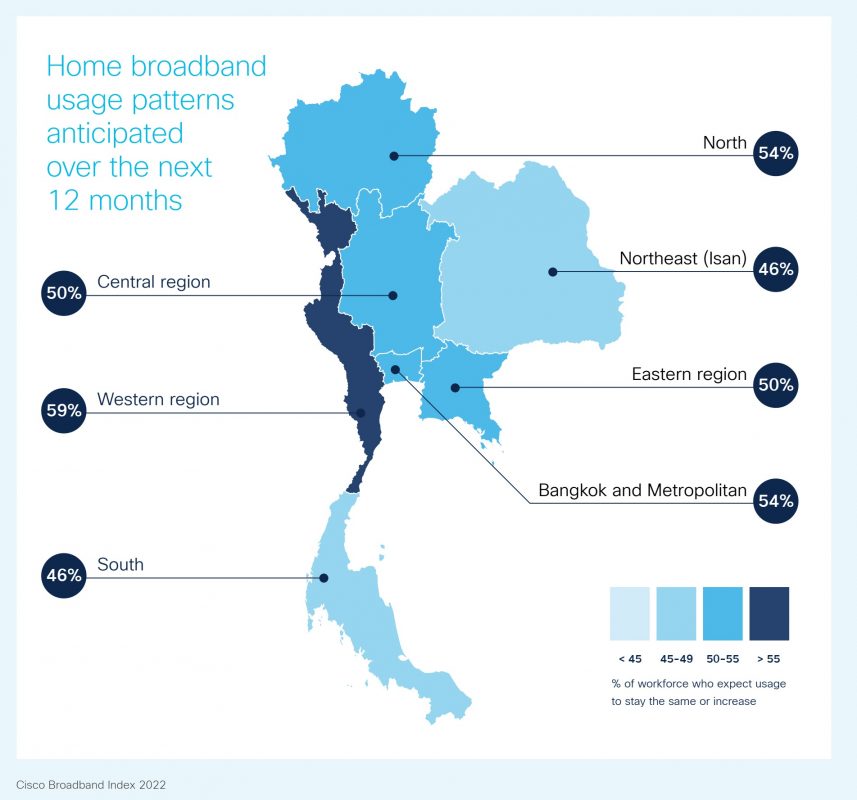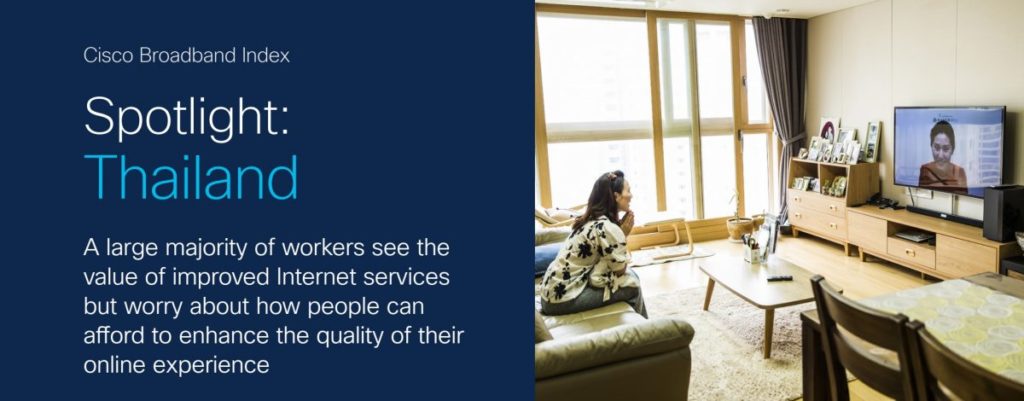- More than eight in 10 respondents believe having access to fast and reliable internet is critical to future economic growth (87%), and a well-educated population (88%).
- 86% of workers think broadband services need to dramatically improve to enable them to work from anywhere.
- Nine out of 10 Thailand workers actively use their broadband at home for four hours or more each day.
- More than one in two (54%) of Thailand’s workforce now rely on their home internet to work from home or run their own business.
Cisco’s latest Broadband Index reveals that Thailand workers value access to the internet more than ever before, as hybrid working continues to be the norm in 2022. Workers believe that universal access to fast and reliable internet is critical to economic and societal growth, according to the global survey of almost 60,000 respondents across 30 markets, including Thailand, about their home broadband access, quality and usage.
Hybrid Work Depends on Quality Internet
The success of hybrid work hinges on the quality and availability of the internet. 86% of workers say broadband services need to dramatically improve to support this new way of working. Workers also demand not only speed, but also a high level of reliability and quality. Over eight out of 10 respondents (87%) say the reliability and quality of broadband connections is important to them. Dependence on high-performance internet access is underlined by the fact that nine out of 10 Thailand workers actively use their broadband at home for four hours or more each day. Meanwhile, three or more people use the internet at the same time in 63% of Thailand households.
Many teleworkers need more than a basic level of connectivity to support their livelihoods. To address the demands on their broadband connection, close to two-thirds (64%) of Thailand workers surveyed are planning to upgrade their internet service in the next 12 months.
“With hybrid working continuing to be the mainstay for Thailand’s workforce, access to high-performance, secure, and reliable internet is critical for employees to work effectively and productively when they are away from the office,” said Taveewat Chantaraseno, Managing Director, Cisco Thailand. “At Cisco, we work closely with our service provider customers to provide best-in-class internet infrastructure and services across Thailand, enabling the success of a future-proof hybrid workforce, where employees can collaborate seamlessly and securely, no matter where they are.”
Critical for Small and Medium Enterprises
With over half (54%) of Thailand’s workforce now relying on their home internet to work from home or run their own business, access to secure, reliable internet is more important than ever to ensure the smooth running of operations. This is especially critical for small and medium-sized enterprises (SMEs), that do not have the same resources and IT infrastructure of larger enterprises.
At the same time, a new digital business environment has emerged where ambitious entrepreneurs, start-ups and SMEs can prosper, fostering innovation across industries. To that end, broadband connectivity will play a key role in the growth and evolution of this core business category, which had 3.1 million SMEs as of last year, according to government data.
Security Is Vital
In order to work from anywhere, employees need to connect to their company’s networks and applications from outside the office, accessing private data across multiple locations, through multiple devices, via public and private networks. Workers are becoming increasingly aware that safety and security, as well as speed and reliability, will be vital to the success of hybrid working. 76% of Thailand workers who work remotely full time or in a hybrid work arrangement would pay more for a safe broadband connection, revealing that security is top of mind for many respondents.
Bridging the Digital Divide
Beyond the business world, improving the quality of access to internet has a far broader impact on the economy and society. 87% of respondents in Thailand believe that having access to fast and reliable internet is critical to future economic growth, and 88% believe it is critical to developing and maintaining a well-educated population. The same number of Thailand respondents (87%) say everyone should be able to securely connect to fast and reliable internet, regardless of location.
“As of today, more than 40% of the world still remains unconnected. The inability to connect those roughly 3.4 billion people over the next 10 years risks widening the digital divide even more,” said Guy Diedrich, SVP & Global Innovation Officer, Cisco. “As business leaders and technologists, we must help the rising tide of the digital age lift all ships; time is of the essence.”
Data from the Cisco Broadband Index survey underscores concerns regarding the digital divide: 85% of Thailand respondents say access to affordable and reliable broadband will become a major issue for people, as connectivity becomes even more vital for access to job and educational opportunities. Three-quarters (75%) of Thailand’s workforce say they were unable to access critical services such as online medical appointments, online education, social care and utility services during lockdown, due to an unreliable broadband connection.
Partnering for Digital Inclusion
The critical need for universal broadband presents a big opportunity for governments and industries to work together and take action. 87% of respondents would like to see governments accelerate plans to ensure high-speed and reliable internet is available to everyone. Governments can establish broadband policies and programs that encourage competition, drive internet investments, and expand its reach. Employers can support their workforce by adopting the right technology for their particular hybrid work model. Service providers can partner with governments to develop programs that address the needs of the unserved or underserved and adopt new ways of networking to power the ‘Internet for the Future’ that will meet demand.
“As businesses, governments and users embrace the hybrid future of work, businesses need an end-to-end IT infrastructure to provide users with a seamless experience. From application experience and visibility to security and connectivity, Cisco partners with businesses and government agencies to power an inclusive future for all,” added Chantaraseno.
Source: PC & Associates Consulting

